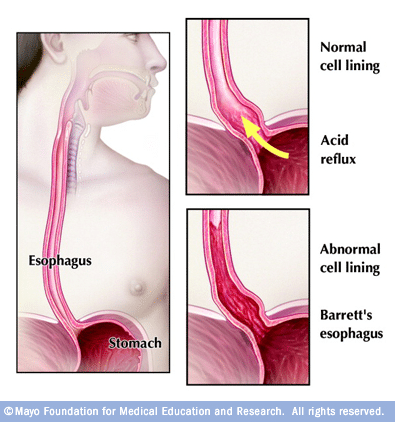
Overview
Barrett’s Esophagus is a condition where the lining of the esophagus becomes damaged. This change is often associated with long-term gastroesophageal reflux disease (GERD), a condition where stomach acid backs up into the esophagus. This can lead to an enhanced risk of developing esophageal cancer. It is important to follow up regularly with your physician. Many people with Barrett’s Esophagus have symptoms of GERD like heartburn, difficulty swallowing and non-cardiac chest pain.
How is it diagnosed?
Barrett’s Esophagus is a condition that is associated with esophageal cancer. Screening for Barrett’s is usually for patients who have a history of acid reflux and other risk factors. Other factors that increase your risk of Barrett’s include obesity, GERD, male over the age of 50, Caucasian race, smoking and family history of Barrett’s or esophageal cancer. Diagnosing Barrett’s usually involves an upper endoscopy (EGD), where a flexible tube with a camera is passed down the throat to examine the esophagus. During this procedure, your physician may take biopsies from the esophagus to access for damage or dysplasia (changes in cells). It usually takes years for damage to develop so it is ideal to you to get treatment for GERD symptoms right away.
How is it treated?
Treatment for Barrett’s focuses on managing risk factors and reducing the risk of complications, particularly the development of esophageal cancer. Options can include lifestyle modifications such as dietary changes, weight loss and quitting smoking to reduce acid reflux. Medications like Omeprazole to treat can also be used to reduce stomach acid. Regular follow up endoscopies are often recommended to look for any changes. Depending on the severity, endoscopic resection, radiofrequency ablation or cryotherapy can be used to remove damaged or abnormal tissue.
References
Mayo Clinic. (2023). Barrett’s Esophagus. https://www.mayoclinic.org/diseases-conditions/barretts-esophagus/symptoms-causes/syc-20352841
Cleveland Clinic. (2024). Barrett’s Esophagus. https://my.clevelandclinic.org/health/diseases/14432-barretts-esophagus


